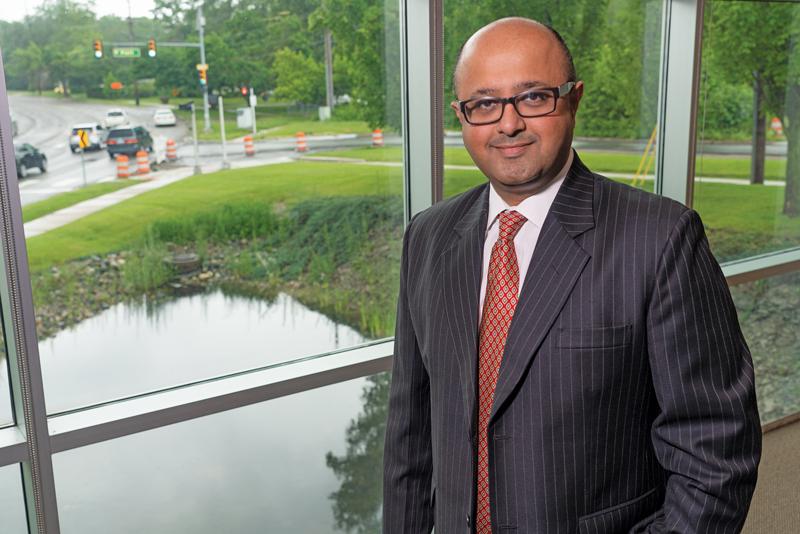New to U.S. courtrooms, attorney Ashish Joshi addressed the judge as “your lordship,” the honorific used in his native country, India. Quickly recognizing the faux pas, he apologized, assuring the judge he’d meant no disrespect. To his relief, the judge was amused, commenting “No, no, I like the sound of it.”
It was a rare blunder for Joshi, who holds law degrees from both Gujarat University in India and the University of Michigan. Just forty-three, he has built a reputation as a gifted and aggressive litigator in criminal, business, international, and, particularly, family law, where he specializes in some of the most bitter child custody cases. “I’ve had judges scream at me,” he says.
—
When he started at U-M Law School in 2001, Joshi didn’t expect to remain in Ann Arbor and had no particular interest in family law–his training in India emphasized corporate litigation. Today, he’s an expert in custody disputes involving “parental alienation.”
It’s a relatively new term for an old phenomenon: one parent turning the children against the other.
Angry, estranged parents enlisting their children in their battles is hardly new, and many therapists and lawyers questioned the concept’s legitimacy when it was introduced in the 1980s. But Joshi says it’s now widely accepted around the world–he’s part of a team that’s currently litigating a Belgian woman’s case before the European Court of Human Rights–and is gaining ground in the U.S. This spring, a New York judge ruled that the concept is sound, and created a legal template for proving parental alienation.
For privacy reasons, Joshi declines to share details of past cases or ask former clients to be interviewed. But he posts unsigned testimonials on his firm’s web page. “Alienation cases are very counter intuitive, and a typical family law attorney is a waste of time and money,” one client writes. “Ashish was the answer. If I had not made that move [to hire him], I would have forever lost my children.”
While Joshi is an aggressive advocate, Ann Arbor therapist Siri Gottlieb says he brings “a very nuanced understanding” to these cases. Grand Rapids attorney Amy Rademaker points out that Joshi is skilled in pushing the various professionals (social workers, lawyers, court staff) involved in custody cases. “He’s not condescending, but he is goal oriented.”
“Although he’s the utmost professional, he is zealous about mining the truth and will challenge me and other mental health professionals working a case,” writes West Michigan therapist Randy Flood. “He works diligently and smartly for his clients, leaving no room for others to be incompetent or the courts to be without critical information in understanding a case and pursuing judicious and timely outcomes.”
“The single most important thing is to learn the case,” says Joshi. “You have to digest the police reports, the therapy reports.” Crucial questions need asking, he says, like “What was the relationship [between parent and child] prior to the separation, before the divorce?” The professionals involved, he says, don’t always ask.
Joshi’s office occupies a striking office building at the intersection of Huron Pkwy. and Platt. A wall of windows in the conference room looks out on a good-sized pond. Wearing a crisp, pin-striped shirt, and dark pants, he conveys confidence without arrogance, thanks to an impish smile and the ability to laugh at himself.
He speaks British English with a lilting Gujarati accent. His father was a corporate executive in the city of Ahmedabad, his mother a nonpracticing lawyer. Deciding in high school that he wanted to be either a lawyer or a politician, he settled on the law.
As a lawyer in India, he handled some international cases and eventually decided to study law abroad. “I wanted to expand my horizons!” he exclaims. To the sorrow of their parents, he and his brother, Sohil, accepted at the University of Detroit Mercy’s business school, flew together to Detroit shortly before 9/11.
Already anxious, their parents worried that as foreigners, the brothers would be harassed in the wake of the terrorist attacks. They weren’t, and Joshi and his wife, Payal, were glad to find many other Indian nationals here.
Like many U-M law grads, he got big-firm offers upon graduation. But the firms wanted to assign him overseas–and once he left, he’d have to start from scratch if he wanted to become a U.S. citizen. So when Payal spotted an Ann Arbor News ad for a “legal research assistant,” he applied.
In an office over the People’s Food Co-op, he met psychologist and attorney Demosthenes Lorandos, who hired him–and advised him to drop the accent-reduction classes he’d started. Joshi wanted to learn how to do jury trials, which don’t exist in India; Lorandos told him that above all, juries want attorneys to be interesting–and his accent would help him be that.
The short-term assignment evolved into a full-time position at Lorandos’s firm, and then partnership. The author of Parental Alienation: A Handbook for Mental Health and Legal Professionals, Lorandos mentored Joshi in the work. When he retired from active litigation to focus on teaching, publishing, and testifying as a forensic expert, Joshi took over.
Payal, also a lawyer, manages the firm, whose small staff includes another attorney, a research assistant with a psych background, and a couple of paralegals.
Despite its small size, the firm takes on a wide variety of cases–criminal, divorce, business disputes, and international disputes, especially those from India.
A few years ago, Joshi was in New Delhi trying to craft a resolution in a trade secret case where the FBI became involved. It’s a relief, he says, “to switch from a crazy, contentious alienation case” to a “commercial, litigation breach-of-contract [dispute] involving not children, just money.”
—
Soft-spoken and graceful, Payal sits in on the interview and provides some nonlegal context. She is the firmer parent of their two young sons, she says, and the couple takes turns making dinner, with her husband an excellent maker of curries.
The couple met as undergrads in India. Asked what attracted him to her, he throws out his hands and says “A catch!” When the question volleys to Payal, she laughs and says she enjoyed listening to his stories, and he repeats “A catch!”
Widely published, Joshi edits the American Bar Association magazine Litigation, where he enjoys interviewing legal celebrities like Alan Dershowitz. The kind of conflicts that end up in court continue to fascinate him.
“At the end of the day, litigation is about problem solving,” he says. “I love what I do!”


